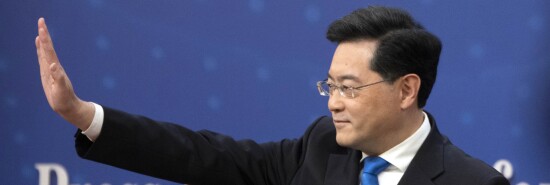
China unleashes the wolf warriors against South Korea and the Philippines
Tom Rogan
Video Embed
Increasingly paranoid about dominating its Asia-Pacific neighbors, China is again unleashing its “wolf warrior” diplomatic strategy. Centered on aggressive rebuttals of what Beijing regards as affronts to its core interests, the wolf warrior strategy has been relatively dormant over the past 18 months. Chinese leader Xi Jinping appeared to recognize that it was doing more harm than good.
No longer. In a series of outbursts this week, a Chinese foreign ministry spokesman and Beijing’s Global Times propaganda newspaper have unleashed the wolf.
THE US SHOULD HELP UKRAINE DISSECT CRIMEA FROM RUSSIA, NOT SEIZE IT
First up, the Philippines.
Tensions between the two nations have risen in recent weeks. China is infuriated by a recent agreement that would allow the U.S. military to use new bases in the northern part of the Philippines. These bases would be of significant utility in a war with China.
Yet, disregarding the fact that the United States and the Philippines are treaty allies, Beijing is now demanding that Manila backtrack. Noting the visit of China’s Foreign Minister Qin Gang to the Philippines on Friday, the Global Times declared that recent Philippine actions have been “unacceptable to China.”
It added that “military cooperation between the Philippines and the U.S. has reached a concerning level. It is necessary for the Philippine side to provide more sufficient explanations” and concluded Manila “should maintain a high degree of sober mind.” Most absurdly, the newspaper said that “China has shown the utmost respect and goodwill toward the Philippines, with great restraint in its tone.”
Really?
Taking aside the hectoring rudeness of the Global Times’s editorial, recent weeks have seen Chinese coast guard ships increasingly harass Philippine vessels with various tactics such as shining high-powered lasers. Is this “great restraint”? China has been firing its lasers because the Philippines has the gall to operate in waters close to its shores — waters that China illegally claims as its own.

“Illegally” and “absurdly” are a better choice of words. The map below shows the waters China claims as its own, constituting nearly the entirety of the South China Sea. The lunacy of these claims is perhaps best underlined by the fact that the James Shoal (by dash #4) is 70 miles from Malaysia but 1,000 miles from the closest Chinese territory of Hainan Island. China, without any legitimate historic or political claim, says it has incontrovertible sovereignty over the James Shoal and everything else within those 10 dashes (look at where dash #10 is).
Next up, there’s South Korea.
Seoul summoned the Chinese ambassador on Friday following insulting remarks by Chinese foreign ministry spokesman Wang Wenbin. Wang angered Seoul by criticizing the South Korean president’s comparison of tensions over Taiwan to the North Korean nuclear program. Wang declared that “the issue of the Korean Peninsula and the Taiwan question are completely different in nature, cause and history and cannot be mentioned in the same breath.” On Friday, Wang maintained this stance, explaining that Beijing had made “serious” complaints to Seoul.
This silliness isn’t very helpful to China’s interests. True, diplomatic insults are not a problem for France and Germany, whose leaders (German Foreign Minister Annalena Baerbock aside) have turned themselves into human carpets for Xi. Nevertheless, most governments possess at least moderate resolve that their Chinese interchanges should extend beyond Communist Party lecturing. And where, as in these two cases, China doubles down on the lecturing, it fosters popular disenchantment that then encourages more robust government responses against its interests. Much like Xi’s economic policy, the means of China’s diplomacy are thus utterly self-defeating to the desired ends. There is a reason that China is viewed increasingly poorly around the world.
Yet there’s an almost childish quality to Beijing’s diplomatic rhetoric. Take Wang’s response to the U.S. indictment of Chinese security agents who allegedly ran an illegal police station in New York. Rather than sidestepping the uncomfortable issue, as a normal diplomat might do, Wang went into attack mode. He said that “the U.S. should reflect on what it has done and immediately stop and correct its wrongdoing.”
It might sound good to Central Foreign Affairs Commission chief Wang Yi and Xi. It doesn’t, however, sound good or credible to anyone else. Quite the contrary.
